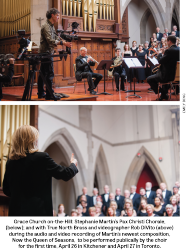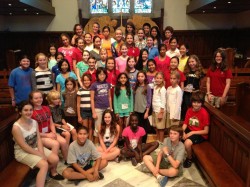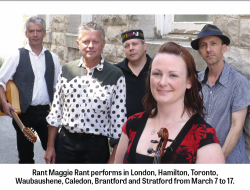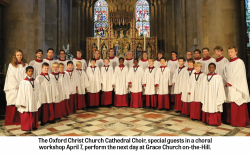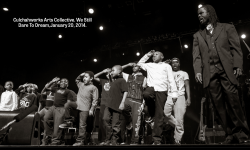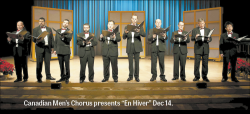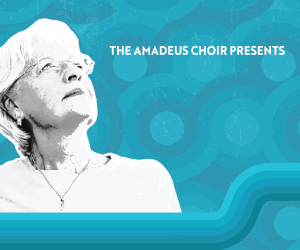What’s That Whistling Sound?
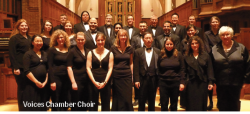 That whistling sound you heard this week might have been an entire city breathing a sigh as the last vestiges of this wretched winter – which lasted well into April – finally passed away and we all unclenched our shoulders from around our ears. (On the other hand it might have been the sound of more than 120 choirs flocking to this month’s Canary Pages – see page 29 – something that has become an annual rite of passage for choirs in this part of the world.)
That whistling sound you heard this week might have been an entire city breathing a sigh as the last vestiges of this wretched winter – which lasted well into April – finally passed away and we all unclenched our shoulders from around our ears. (On the other hand it might have been the sound of more than 120 choirs flocking to this month’s Canary Pages – see page 29 – something that has become an annual rite of passage for choirs in this part of the world.)
As usual, Toronto came in for lots of scorn from Canadians this year for not being tough enough to withstand winter conditions that other parts of the country would consider mild, or at least normal.
For these folk, I have five words: “Union Station at rush hour.” By the end of the winter, the Canadian military had recruiters stationed on the subway platform ready to enlist the winners of the trench warfare that took place at Union every day. Nobody’s tougher than Torontonians. Or meaner, after this winter; out-of-towners, you’re warned.
This year’s spring concerts are likely to combine triumph and relief in equal measure. There are many choices to be found in the listings; below are several.
Spring-Themed Concerts: On May 4 the Etobicoke Youth Choir performs their spring concert, entitled “Why We Sing.”
On May 10 the Toronto Swedish Singers perform their “Annual Spring Concert.” The evening includes a selection of Swedish and Nordic music. I confess that this group is new to me – I hope to find them in these pages in the future.
Also on May 10, the Toronto Welsh Male Voice Choir performs their “Spring Gala Concert.”
The Echo Women’s Choir performs “Singing! Here! Now!” on May 11, with an eclectic program that includes folk music from China, the Balkans and Ukraine.
On May 31 the St. Elizabeth Scola Cantorum Hungarian Choir performs their spring concert, which includes Schubert’s Mass in G and works by Hungarian composer Zoltán Kodály.
Festivals: Jewish Music Week in Toronto, May 18 to 25, is the brainchild of Aliza Spiro. In its fourth year, it is increasingly attracting the attention of Toronto audiences and the many Jewish musicians in the city who welcome the opportunity to showcase their talents and artistic projects.
There are many excellent solo performers and ensembles participating in this festival. Choral ensembles include Lachan Jewish Chamber Choir, taking part in a free May 19 concert, “Vocals for Victoria Marathon,” at Nathan Phillips Square.
The Lirit Singers, perform in “Music of Milton Barnes” on May 20. Barnes was a Jewish-Canadian composer whose approachable music, rooted in jazz and traditional Jewish sources, continues to be performed by many performers and ensembles.
More information about this event can be found at
jewishmusicweek.com.
SING! The Toronto Vocal Arts Festival: May 30 to June 1,is an intensive weekend of a cappella vocal music. Taking place at Harbourfront, it is a well-curated eclectic mix of choirs, smaller vocal ensembles and soloists. Choirs performing during the weekend include the Cantemus Singers and Cawthra Park Chamber Choir, Pax Christi Chorale, That Choir and Hamilton Children’s Choir.
On May 31, a number of these ensembles will take part in a concert devoted to the music of R. Murray Shafer. Later on the afternoon of the same day, several of the vocal ensembles and soloists from the festival will sing musical accompaniment to a selection of National Film Board of Canada short films. NFB shorts, most famously the works of Norman McLaren, are renowned among film aficionados and have won awards all over the world.
More information about the festival schedule can be found at torontovocalartsfestival.com.
Women in Music:Preparing for an exam, one of my students remarked on the almost complete absence of female composers in the repertoire syllabus. Stumbling to explain why this might be the case well into the 21st century, with the amount of historical resources now available, I pondered uneasily the degree to which the educational canon in music often lags behind the initiative taken by performers. There is plenty of music available written by women, currently and from past centuries, and this should be reflected in student as well as concert repertoire.
On May 24 the Jubilate Singers present “Inspire! music by Canadian women.” The program includes works by familiar and established composers Eleanor Daley, Stephanie Martin, Suba Sankaran, and Shelley Marwood, a musician currently pursuing a graduate degree in composition who is beginning to fulfill commissions for ensembles across Canada.
For an historical take on female composers, consider the Voices Chamber Choir’s “Go, Lovely Rose” on June 7. The concert includes works by Hildegard von Bingen, Fanny Hensel, Imogen Holst, Ruth Watson Henderson and others. Fanny Hensel was Felix Mendelssohn’s sister; Imogen Holst was the daughter of Gustav Holst. Both women had rich and varied musical careers; I’d encourage both choral audiences and students interested in the subject to explore their compositions.
War and Struggle:2014 is the centenary of the start of the First World War. Remembrance ceremonies will begin in earnest in the summer, but several choirs have spring concerts with themes of battle and memory. Music was of tremendous importance in both world wars – music to inspire, music to galvanize, to bolster, comfort and commemorate. There is a rich legacy of compositions that choirs can draw upon.
On May 10 the Peterborough Singers perform Maurice Duruflé’s Requiem and Welsh composer Karl Jenkins’ The Armed Man: A Mass for Peace.
On May 31 Barrie’s King Edward Choir performs “KEC Remembers: Songs of Love, Loss and Victory!” The concert includes songs, letters and poetry that commemorate the lives of those lost 100 years ago in World War I.
On June 7 Kingston’s North Lakeshore Mass Chorus performs “Till the Boys Come Home,” also a tribute to those who served.
Finally, a shout-out to another Toronto ensemble that has slipped under my radar in the past. On May 31 the French-themed Ensemble vocal Les voix du coeur performs “Quand on chante, on a toujours 20 ans” (When you sing, you’re always 20 years old). The concert is comprised of popular French songs from different parts of the world. The program is given at 2pm and 8pm.
Benjamin Stein is a Toronto tenor and lutenist. He can be contacted at choralscene@thewholenote.com.
Visit his website at benjaminstein.ca.


